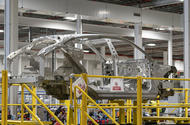Weak domestic and overseas demand responsible for heavy year-on-year decline
New figures from the Society of Motor Manufacturers and Traders (SMMT) show that UK car production dropped 18.2% year on year in October.
Over the course of the month, 110,179 new cars left UK factories, compared with 134,669 in October 2019. The 24,490-unit shortfall is attributed by the trade body to domestic and overseas lockdowns subduing demand.
A 19.1% drop in cars built for export amounted to a loss of 21,569 units, with shipments to the US falling 26% and the European Union 25.7%, while 2921 fewer cars were produced for the domestic market.
However, the SMMT notes that stronger demand in Japan and China – 57.1% and 9.7% boosts respectively – went some way to offsetting declines elsewhere.
For the year to date, according to SMMT data, UK car production is now down 33.8% compared with 2019, with a loss of 379,308 units amounting to a £10.4 billion shortfall.
In recent months, the SMMT has ramped up its efforts to convince the government of the importance of a secure trade deal with the EU after Brexit. With no deal in place, it says, the UK car industry could lose as much as £55.4bn in revenue over the next five years.
“Even with a so-called ‘bare-bones’ trade deal agreed,” the SMMT said, “the cost to industry would be some £14.1bn.”
Just over a month remains until the UK is scheduled to officially leave the EU, but final trading terms have yet to be agreed by both parties.
SMMT chief executive Mike Hawes said: “These figures are yet more bad news for an industry battered by Covid, Brexit and, now, the unprecedented challenge of a complete shift to electrified vehicles in under a decade.
“While the sector has demonstrated its resilience, we need the right conditions to remain competitive both as a manufacturing nation and a progressive market. Yesterday’s Spending Review recognised the need to invest in a green industrial revolution, but this must be at globally competitive levels and equal to the scale of ambition to keep this sector match fit.
“Above all, we must have a Brexit deal, one with zero tariffs, zero quotas and rules of origin that benefit existing products and the next generation of zero-emission cars, as well as a phase-in period that allows this transition to be ‘made in Britain’.”
Read more
SMMT issues final plea for tariff-free Brexit trade deal
EU automotive bodies call for urgent post-Brexit trade deal
Inside the industry: How long will Brexit blight the car world?
Source: Autocar
